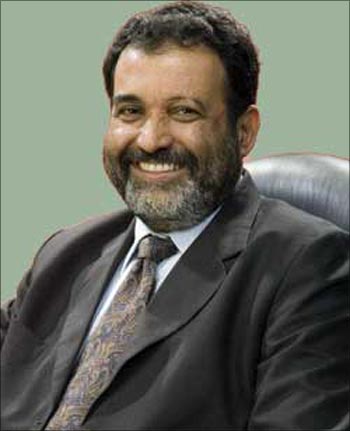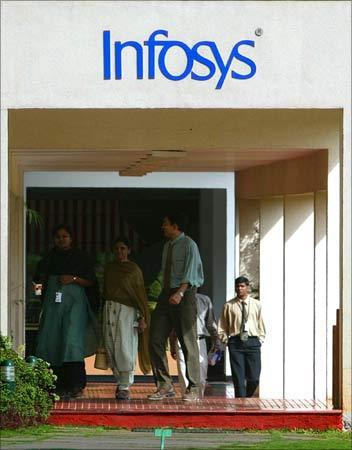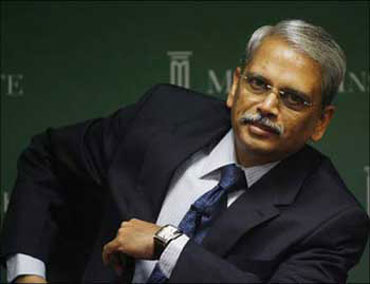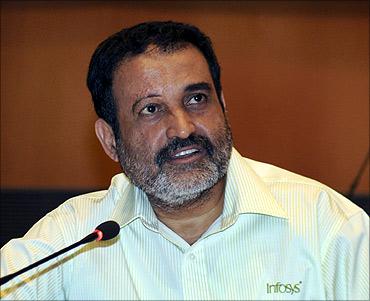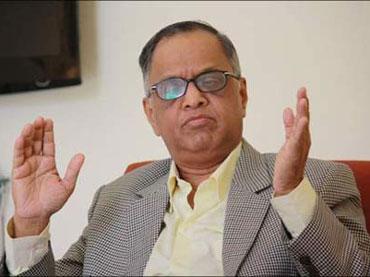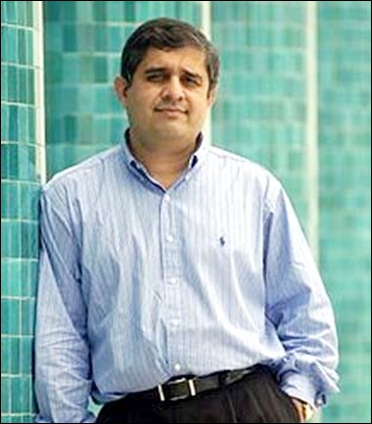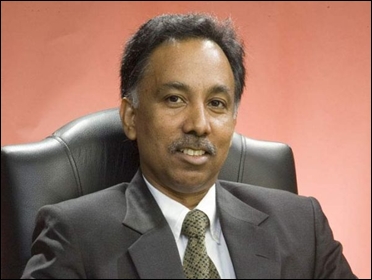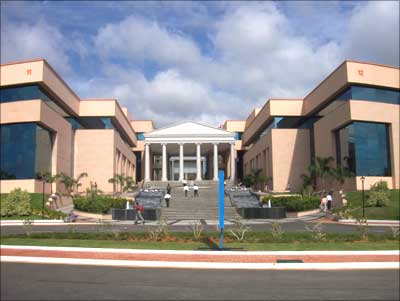 | « Back to article | Print this article |
Is Infosys like a family dominated-business?
First, T V Mohandas Pai announced his decision to quit Infosys on the day the company declared its lukewarm results.
A combination of the two put the stock in a plunge. Then, he told a newspaper that he had quit because he felt that the co-founders called all the shots, marginalising those like Pai even though they had given their life to building the company.Click NEXT to read on
Is Infosys like a family dominated-business?
Click NEXT to read on
Is Infosys like a family dominated-business?
Infosys Chief Executive Officer Kris Gopalakrishnan, too, sought to douse the fires, saying: "I would not like to comment on anything pertaining to this discussion at this point."
However, the fires continue to rage, and are fuelled by murmurs, like: "Is Infosys like any other family-dominated business, except that it has co-founders instead of a family?" Some industry experts say Pai's reactions stem from his "frustration" at not being able to reach the top, not for some time at least, but there was some substance in his outpourings.Click NEXT to read on
Is Infosys like a family dominated-business?
"Whatever Pai is today is because of Infosys. Everything was fine with him till he was there at Infosys. It is like a troubled man's troubled outbreak. If he was really dissatisfied with some policies, what was he doing all these days? Why is he suddenly coming out in the open?" says B S Murthy, an HR expert who now heads LeadershipCapital, a top executive search firm.
"He should know that confidentiality is the key for corporate honchos and he should know the implications of everything he utters in public," he added.Click NEXT to read on
Is Infosys like a family dominated-business?
In the three decades of Infosys' existence, the top leadership position at the company has stayed with co-founders. It is an unwritten rule that is expected to be in place for a few years, at least till the last of the co-founders retires from the company.
Insiders say co-founders are more powerful in the company, not because they founded it, but because they realise the importance of what it took Infosys to reach its present position as the country's second-largest software exporter. It is learnt that N R Narayana Murthy, the non-executive chairman who is set to retire in August this year, takes most of the decisions.Click NEXT to read on
Is Infosys like a family dominated-business?
"People come to him for suggestions and guidance, instead of him asking them to report to him every day. It's because he understands the company, the clients and their needs better than anybody else due to his huge experience," said a company insider pleading anonymity.
Is Infosys becoming another family-controlled business? No, say analysts.
Click NEXT to read on
Is Infosys like a family dominated-business?
At the same time, Infosys' claim of grooming the next line of leaders has some substance to it. Otherwise, people like Mohandas Pai would not have made it to the positions they have been holding.
It was not that Pai was the seniormost among the top echelons, but he climbed the ladder on merit, which he can't deny. Even people like V Balakrishnan are senior to Pai at Infosys, but have still not been able to make it to the board.
Click NEXT to read on
Is Infosys like a family dominated-business?
Certainly not, believe most existing and former Infosys executives. In the present structure, except the CEO and COO, other top positions had been there with non-founders who joined the company much after.
"Infosys executive council driving the operations of the company has its members who are non-founders," said Sudin Apte, the founder of offshoring advisory firm Offshore Insights.
Click NEXT to read on
Is Infosys like a family dominated-business?
Besides, most senior employees who left the company in recent years, are believed to have done so because of iRACE (Infosys Role and Career Enhancement) programme, a brainchild of Pai.
The programme reportedly obstructed the career growth of software engineers to the next level which is why the attrition of the company went up during the slowdown.
Click NEXT to read on
Is Infosys like a family dominated-business?
HR and industry experts also believe Pai, though a great administrator, was not CEO material for a technology company.
"Pai is very good in finance and HR. But he does not have sales background, a must for CEOs of technology companies. I am not sure how S D Shibulal will prove if given the position of CEO, as he is primarily a strategy man," said an analyst of a global analyst company.
Click NEXT to read on
Is Infosys like a family dominated-business?
Is Infosys like a family dominated-business?
"Such statements keep coming in when people part with their employers. After some time, everybody will forget it and people may not even remember who was Pai, after two years," said the CEO of an Indian IT services company, wishing not to be named.
Click NEXT to read on
